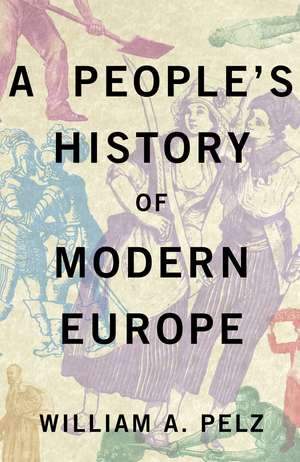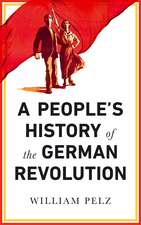A People's History of Modern Europe: People's History
Autor William A. Pelzen Limba Engleză Paperback – 19 mai 2016
The origin of capitalism and modern industrialism—and, not unrelated, the birthplace of Marxism—modern Europe provided the perfect conditions for a great number of political revolutions. From the monarchical terror of the Middle Ages to the mangled Europe of the twenty-first century, A People’s History of Modern Europe tracks the history of the continent through the deeds of those whom mainstream history tries to forget.
Along the way, William A. Pelz examines the German peasant wars of Thomas Müntzer, the bourgeoisie revolutions of the eighteenth century, the rise of the industrial worker in England, the turbulent journey of the Russian Soviets, the role of the European working class throughout the Cold War, and the revolutionary students in 1968. He then brings his story to the present day, where we continue to fight to forge an alternative to a heartless and often barbaric economic system.
As Germany and Greece argue over who owes what, with the very idea of Europe crumbling around them, Pelz’s accessible, provocative history could not be timelier. Sure to resonate with fans of books like Howard Zinn’s A People’s History of the United States, this people’s history sweeps away the tired platitudes of the privileged and provides an opportunity to understand the story of Europe from the ground up.
Along the way, William A. Pelz examines the German peasant wars of Thomas Müntzer, the bourgeoisie revolutions of the eighteenth century, the rise of the industrial worker in England, the turbulent journey of the Russian Soviets, the role of the European working class throughout the Cold War, and the revolutionary students in 1968. He then brings his story to the present day, where we continue to fight to forge an alternative to a heartless and often barbaric economic system.
As Germany and Greece argue over who owes what, with the very idea of Europe crumbling around them, Pelz’s accessible, provocative history could not be timelier. Sure to resonate with fans of books like Howard Zinn’s A People’s History of the United States, this people’s history sweeps away the tired platitudes of the privileged and provides an opportunity to understand the story of Europe from the ground up.
Din seria People's History
-
 Preț: 158.00 lei
Preț: 158.00 lei -
 Preț: 115.17 lei
Preț: 115.17 lei -
 Preț: 148.58 lei
Preț: 148.58 lei -
 Preț: 132.74 lei
Preț: 132.74 lei - 8%
 Preț: 645.49 lei
Preț: 645.49 lei -
 Preț: 116.61 lei
Preț: 116.61 lei
Preț: 213.48 lei
Nou
Puncte Express: 320
Preț estimativ în valută:
40.85€ • 44.36$ • 34.32£
40.85€ • 44.36$ • 34.32£
Carte tipărită la comandă
Livrare economică 22 aprilie-06 mai
Preluare comenzi: 021 569.72.76
Specificații
ISBN-13: 9780745332451
ISBN-10: 0745332455
Pagini: 256
Ilustrații: 8 halftones
Dimensiuni: 152 x 229 x 25 mm
Greutate: 0.44 kg
Editura: PLUTO PRESS
Colecția Pluto Press
Seria People's History
ISBN-10: 0745332455
Pagini: 256
Ilustrații: 8 halftones
Dimensiuni: 152 x 229 x 25 mm
Greutate: 0.44 kg
Editura: PLUTO PRESS
Colecția Pluto Press
Seria People's History
Notă biografică
William A. Pelz is director of the Institute of Working Class History in Chicago and professor of history at Elgin Community College. His recent works include Wilhelm Liebknecht and German Social Democracy, The Eugene V. Debs Reader, and Against Capitalism: The European Left on the March.
Cuprins
Introduction
1. “The King’s in His Castle . . . All’s Right with the World” – The Collapse of the Middle Ages
2. “The Other Reformation: Martin Luther, Religious Dogma and the Common People
3. The World Turned Upside Down: The Crisis of the Seventeenth Century and the English Revolution, 1640-1649
4. Rise of the Third Estate: The French People Revolt
5. Becoming an Appendage to the Machine: The Revolution in Production
6. From the Revolutions of 1848-1849 to the First Peoples Democracy: Paris Commune
7. Rise of the Working Classes: Trade Unions and Socialism, 1871-1914
8. Protest and Mutiny Confront Mass Slaughter: Europeans in World War I
9. War Leads to Revolution: Russia (1917), Central Europe (1918-1919)
10. Economic Collapse and the Rise of Fascism, 1920-1933
11. Against Fascist Terror, War and Genocide, 1933-1945
12. A New Europe, 1945-1948?
13. Europeans in the Cold War: Between Moscow and Washington
14. From Berlin Wall to Prague Spring- A New Generation of Europeans
15. Fighting for Peace in an Atomic Age, 1969-1989
16. Europe falls into the Twenty-First Century
Notes
Index
Recenzii
“A People’s History of Modern Europe cuts through some of the myths . . . that shape perceptions about Europe in much of the English-speaking world. . . . Pelz’s myth-busting clears the way for a sweeping account of historical developments from the Middle Ages to post-communist Europe. . . . But of course he gives them a history-from-below twist.”
"In this lively and engaging book, Pelz takes the reader through a thousand years of European history from below. This is the not the story of lords, kings and rulers. It is the story of the ordinary people of Europe and their struggles against those lords, kings and rulers, from the Middle Ages to the present day. Written in a lucid and accessible style, A People's History of Modern Europe is a fine introduction to the subject which will be appreciated by students and activists alike."
"From the Peasants’ Revolt of 1381 to the collapse of the Soviet Union, Pelz presents a challenging alternative to the conventional narratives of European history, putting the sufferings and the resistance of working women (often written out of history) and men at the centre of the story. There are strikes, riots, mutinies and revolutions, but they are carefully entwined with economic structures and conflicts and with aspects of everyday life. Based on a wide range of sources, it gives us a comprehensive but concise account, illuminating its arguments with a mass of concrete detail."
"Pelz’s A People’s History of Modern Europe is an alternative reading of modern European history, a sharp break with the standard commentaries on the subject. Beginning with the Middle Ages, the book is a fascinating journey across centuries towards the world as we experience it today in the 21st century. However, as distinct from the established names who figure most prominently in the popular accounts of this long period, it is the voice of the ordinary people, the less prominent figures, the women in particular, their ideas and actions, protests and sufferings that have gone into the making of this alternative narrative and therein lies the strength and uniqueness of the volume. A product of rigorous research, yet very comprehensive, it is a book of a different genre, which would remind the reader of A.L. Morton’s A People’s History of England and the writings of Eric Hobsbawm."
"This is a history of Europe that doesn’t remove the Europeans. Here there are not only kings, presidents, institutions but the pulse of the people and social organizations that shaped Europe. A must-read."
"This book is an exception to the rule that the winner takes all in historiography. It highlights the importance of the commoners which often is only shown in the dark corners of mainstream history books. From Hussetites, Levelellers and sans-cullotes to the women who defended the Paris Commune and the workers who occupied the shipyards during the Carnation revolution in Portugal. The author gives them their deserved place in history just like Howard Zinn did for the American people. Given the current climate of opinion with an overwhelmingly negative attitude towards the struggles of the commoners this book is a good lesson that resistance is often hard but also necessary and fruitful."
"The author puts his focus on the lives and historical impact of the common people, i.e. those excluded from power and wealth: peasants and serfs of the middle ages, workers during the Industrial Revolution, women in a patriarchic order that transcended different eras. This focus not only makes history relevant for contemporary debates on social justice, it also urges the reader to develop a critical approach towards sources, always asking who is represented and who is lost."
"This book presents us European history as an exciting story of generations of people struggling for better living conditions, social and political rights, for emancipation. This struggles did not always led to immediate success but contributed to the general progress in the long run. This story has to be remembered and specifically considered now, when the very notions of enlightenment, progress and social change are becoming questioned. This means that there are quite a few struggles still ahead of us and we will have to draw inspiration from the experience and history of popular resistance and revolutions of the past."
"A splendid antidote to the many European histories dominated by kings, businessmen and generals. It should be on the shelves of both academics and activists. . . .a lively and informative intellectual tour de force."





















